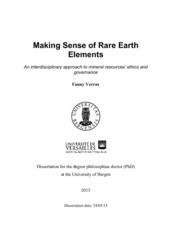| dc.description.abstract | This interdisciplinary PhD dissertation aims to identify and address the ethical challenges posed by rare earth elements, as a non-renewable, ill-distributed, and valuable resource. The overall theoretical framework in which this study is conducted is the one of Post-Normal Science (PNS), in which stakes are high, facts are uncertain and values are in dispute, a description that fits perfectly rare earth elements. One of the flagship recommendations of PNS is the need to rethink the way technocratic decisions are made, so as to involve more people, and more lay-people, when addressing an issue that can potentially affect many. This PhD thesis took this challenge by trying to make sense of different voices that are not usually heard: future generations on one hand, concerned citizens and internet-users discussing governance issues of rare earths on the other hand. The first paper of this PhD thus proposes a philosophical analysis of the concept of future generations, of paramount importance when considering a non-renewable resource, and addresses the question: is there a moral specificity of environmental legacy towards future generations? I suggest that arguments supporting the idea of a moral specificity ultimately come down to three, that I have called the survival argument, the nature argument, and the science argument. I discard all three arguments and propose instead a present-oriented approach which, I contend, is philosophically sounder, and in practice more effective. The second paper relates the result of a participative website, “Sustainable Scenarios” that I created during the PhD to foster a public debate around different ideas of governance. The main finding of this paper is that it is highly problematic to foster public deliberation on environmental issues that are not previously known by the participants and which are not perceived as potentially affecting their personal life. The third paper analyzes over 5000 online comments relating to global trade of rare earths and a WTO dispute settlement case launched in March 2012. It concludes that for most internet-users, the WTO is not the right arena to discuss such an issue, partly because values conflicts are at stake. It suggests that they may be right in this respect and that if institutional renewal is needed in order to address contemporary challenges such as environmental issues, taking into account spontaneous critiques from citizens voicing their opinion on the Internet may be a good way to start if we want our global institutions to address more relevantly the issues we are facing. The overarching conclusion of the PhD dissertation is threefold: (i) It is not necessary to presuppose uniqueness or superiority of environmental threats, neither from a practical point of view in order to address them nor from a philosophical point of view to legitimate the very existence of environmental ethics. (ii) Even though a citizen-driven and innovative debate on environmental issues is highly relevant, such a debate seems to be able to take place only on issues that have been pre-identified by institutions, jeopardizing the innovative aspect of participation through problem definition. (iii) The institutional way of addressing trade disputes over mineral resources is not perceived as, and indeed does not seem adapted to, a protean case reflecting many a conflict between individuals and communities. | en_US |
